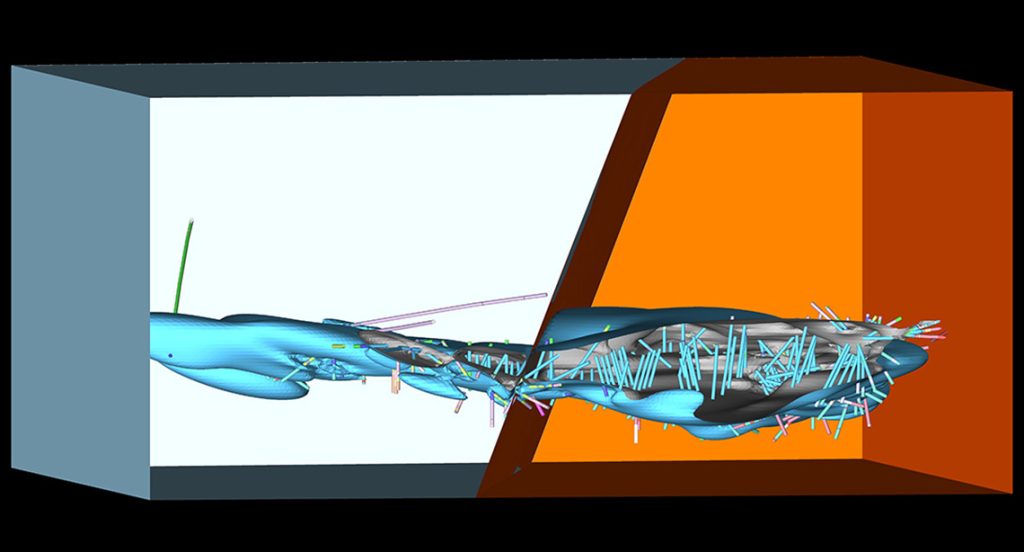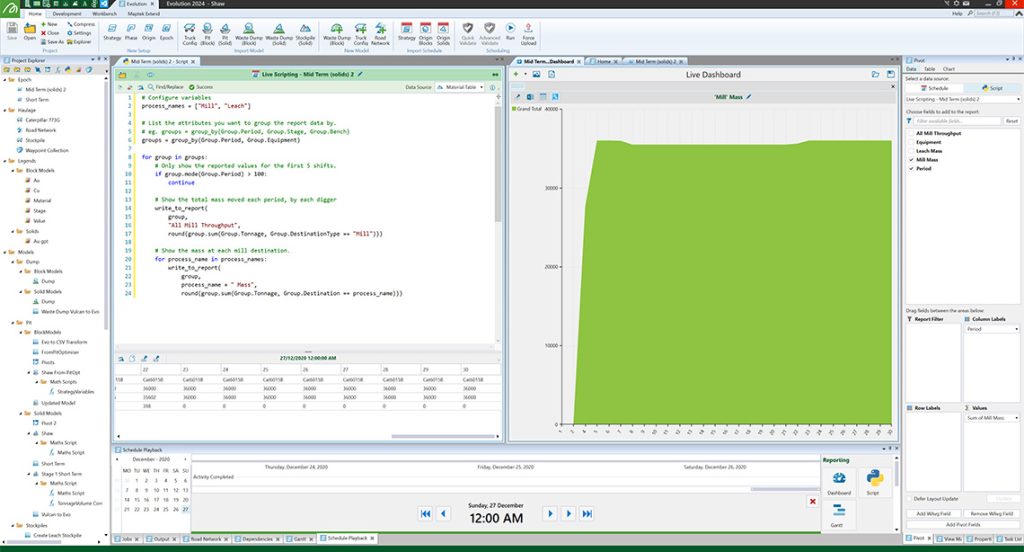March 2024 Issue Index
First quarter 2024 software releases
A tranche of software releases will drop in the first months of 2024 and will be available for download in Maptek Account.
Vulcan 2024
The latest release of Vulcan includes features to make workflows smoother and more efficient. The Quick Mode tool in Interactive Cut Planner seamlessly supports Advanced Reserves specification files, simplifying configuration for a more intuitive planning process. Users can now take full advantage of drillhole collar symbols when loading drillholes, providing a more comprehensive view of geological data.
Grade Control attributes calculation rule is boosted with the introduction of new time variables for faster, more precise results.
Vulcan Data Analyser features enhanced visualisation of data and attributes. Gaussian transformations and simulations can be run from within workflows and the command editor, and linking to third party data and databases is improved.
GeologyCore 2024

GeologyCore 2024, anticipated for release in April 2024, increases the power and usability of the modelling workflow, as well as generating an automatic audit trail each time the model is run.
The enhanced Domain Manager allows better control over how small intervals are handled and surfaces or solids can be used to split or flag existing intervals. Intrusives models can now be added within fault blocks in a faulted geology model.
Modelling Manager and Fault Manager feature improved network relationships panels, and a CSV report of all fault modelling settings used is automatically created on completion of modelling and processing.
Evolution 2024

Evolution 2024 focuses on improvements to Evolution Epoch, supporting additional constraints and process modelling. Python report scripting has been expanded to work with Epoch and Live Dashboards, offering customisable, repeatable reports.
New Destination Priorities allows users to define priority for mill, stockpile and waste by destination to maximise site equipment productivity. If stripping waste is the current highest priority, waste utilities can now be prioritised over mills and priorities can be set within the waste utility group, improving the ability to model scenarios such as building out waste tailings dams.
A new user interface for Epoch Destination Rate constraint helps users to constrain the flow of any accumulation item to any mill or stockpile. Calendars with variable periods, such as the hourly, are now supported. Each destination can have multiple independent limits which are globally considered by the Epoch evaluator.
Epoch allows periodically changing productivities to be easily updated, and reporting to be aggregated in the most useful way. The Waste Area Accumulation constraint allows users to configure rolling maximum quantities of material that can be delivered to a waste area over a given period of time. This can be used to model building out a tailings dam for example.
Python report scripting now provides ultimate flexibility for Epoch users, allowing scripts generated to be used as pivot table data sources. This enables large transformations on the data to be performed directly in Evolution, consistently producing reliable results, while the pivots provide an interface to generate all the charts and graphics required to easily consume the information.
Evolution Strategy speed has been significantly improved, handling more complex scenarios with large block models or many reporting attributes.
A summary of all the changes in the releases can be viewed in Maptek Account. A new end user licence agreement must be accepted to download 2024 software releases.
Workbench 2024
The latest Maptek Workbench enables customers to more easily deploy and manage software seats and application tools within their organisation. Workbench 2024 features enhanced visibility of licence availability, including managing and returning borrowed licences, and session duration metrics. Base solution packages and add-ons are now grouped in a single hierarchical view.
Python-enabled toolkits extend and streamline software functionality in Maptek applications. Open access SDKs and APIs allow users to bring data into the Maptek environment or push it downstream/upstream, leveraging external libraries to optimise processes across teams, sites and operations.

